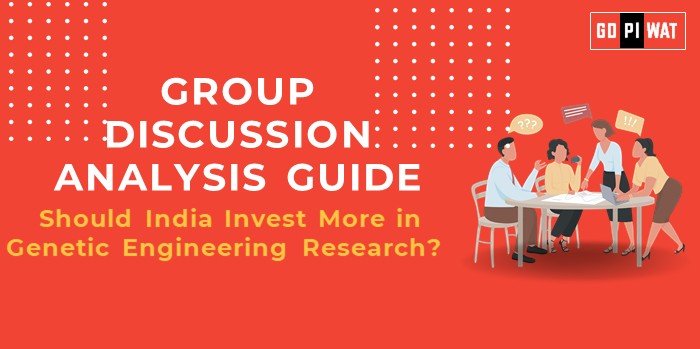📋 Group Discussion Analysis: Should India Invest More in Genetic Engineering Research?
🌐 Introduction
Genetic engineering stands as a transformative tool in addressing global issues such as food security, health crises, and climate challenges. For India, a nation deeply reliant on agriculture and facing rising healthcare demands, enhanced investment in genetic engineering research holds significant potential for national growth and global leadership.
📊 Quick Facts & Key Statistics
• Global GMO Market Value: Valued at USD 133.4 billion in 2024, projected to reach USD 251.53 billion by 2032, growing at a CAGR of 8.25%.
• India’s Agricultural Dependency: Agriculture employs 45.76% of the workforce and contributes 18.2% to GDP.
• Health Sector Growth: India’s biotechnology sector is set to reach USD 150 billion by 2025.
• Regulation Lag: India’s stringent regulatory framework, with Bt cotton as the only approved GMO, limits innovation and adoption.
• India’s Agricultural Dependency: Agriculture employs 45.76% of the workforce and contributes 18.2% to GDP.
• Health Sector Growth: India’s biotechnology sector is set to reach USD 150 billion by 2025.
• Regulation Lag: India’s stringent regulatory framework, with Bt cotton as the only approved GMO, limits innovation and adoption.
🌟 Stakeholders and Their Roles
- 🏛️ Government: Develops policies, allocates funding, and oversees activities through bodies like the Genetic Engineering Appraisal Committee (GEAC).
- 💼 Private Sector: Drives innovation and commercialization of genetic engineering products.
- 🚜 Farmers: Potential beneficiaries of enhanced crop yields but also face controversies surrounding GMO adoption.
- 🤝 Advocacy Groups and Citizens: Shape societal and ethical acceptance of GMOs.
- 🌐 Global Organizations: Set benchmarks and support ethical, sustainable genetic engineering practices.
🏆 Achievements and Challenges
📌 Achievements:
- ✅ Agricultural Productivity: Bt cotton has boosted yields and increased incomes.
- ✅ Healthcare Advances: Technologies like CRISPR show promise in combating genetic disorders.
- ✅ Economic Growth Potential: Rapid expansion of the biotechnology sector positions India for global leadership.
📌 Challenges:
- ⚠️ Ethical Concerns: Risks of ecological disruptions and misuse.
- ⚠️ Regulatory Bottlenecks: Stringent policies delay adoption of innovations.
- ⚠️ Public Resistance: Limited awareness and skepticism about GMOs.
📌 Case Study:
Bt cotton adoption improved incomes but raised ecological concerns, exemplifying the dual impact of genetic engineering in India.
🎯 Effective Discussion Approaches
- Opening Approaches:
- Highlight the economic growth of the GMO market to frame the global context.
- Present India’s agricultural dependency as a key driver for genetic innovation.
- Counter-Argument Handling:
- Use examples of regulatory efficiency from countries like the USA to propose improvements.
- Emphasize public education and stakeholder engagement to address resistance.
📈 Strategic Analysis of Strengths & Weaknesses
- Strengths: Rapidly growing biotech sector, skilled workforce, and agricultural reliance.
- Weaknesses: Regulatory hurdles and public resistance to GMOs.
- Opportunities: Enhanced food security and potential for global biotech leadership.
- Threats: Ethical controversies and ecological risks.
🗣️ Structured Arguments for Discussion
- 👍 Supporting Stance: “Investing in genetic engineering research can secure India’s future in food and health.”
- 👎 Opposing Stance: “Ethical and regulatory concerns must be resolved before further investment.”
- ⚖️ Balanced Perspective: “While promising, genetic engineering requires responsible regulation and public trust.”
🎓 Connecting with B-School Applications
- 📌 Real-World Applications:
- Strategic initiatives in agriculture and biotech industries.
- Balancing innovation and ethics in regulatory frameworks.
- ❓ Sample Questions:
- “How can India balance innovation and ethics in genetic engineering?”
- “Discuss the global implications of India investing in biotechnology.”
- 💡 Insights for B-School Students: Explore public-private partnerships in biotech research and analyze global regulatory frameworks for GMOs.


